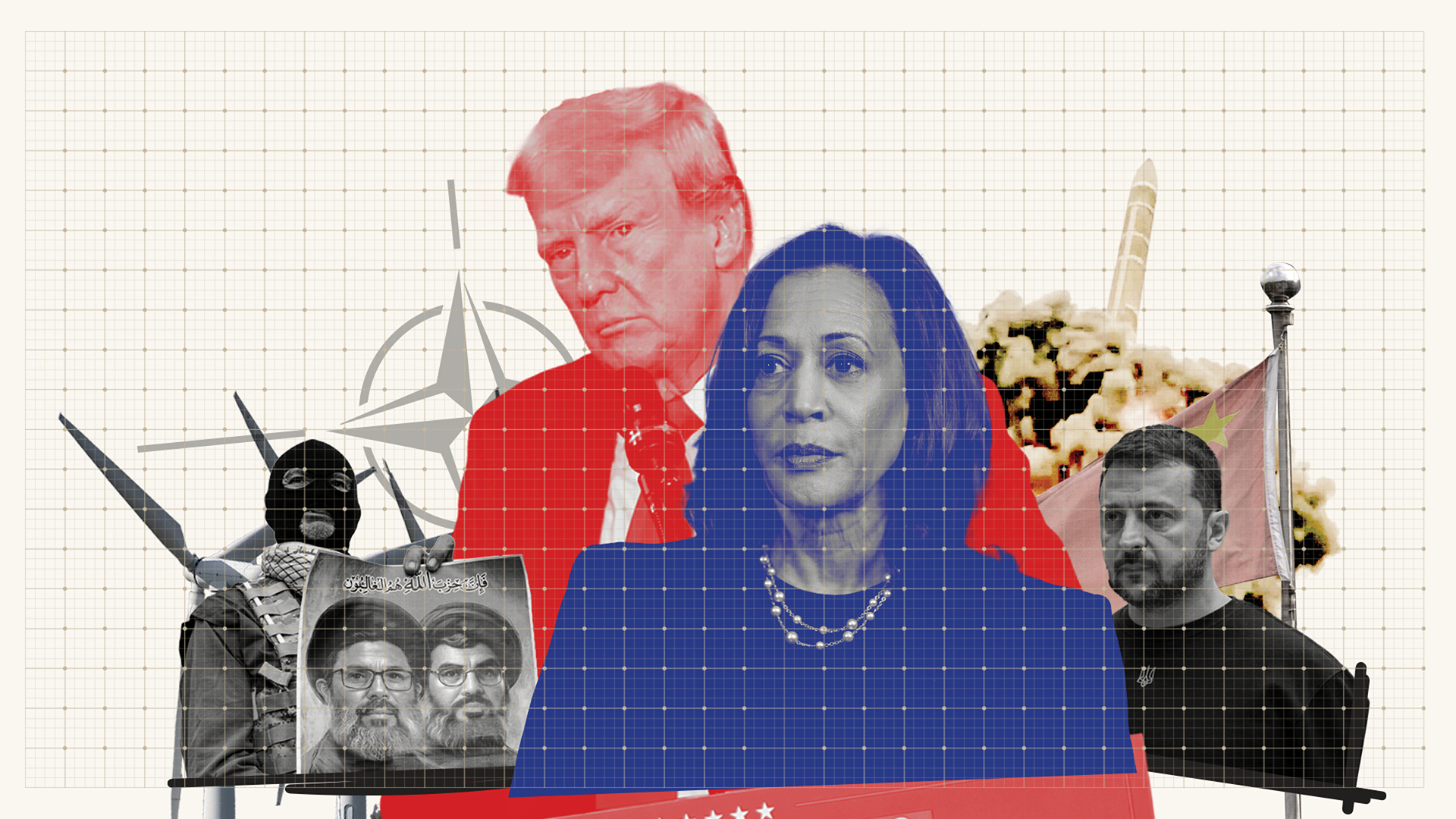International analysts explain to iMEdD what the election of Kamala Harris or Donald Trump could mean for ongoing crises in the Middle East and Ukraine, as well as the US-China trade war, the Climate Crisis, and the US relation with NATO and the EU.
The outcome of the US election will have significant implications for five major international crises, according to analysts speaking to iMEdD just days before November 5. For each crisis, there are two distinct scenarios—one for each candidate—that, in most cases, represent starkly opposing approaches.
What would each candidate’s election mean for the turmoil in the Middle East? Could Trump bring an end to the war in Ukraine? How aggressive will Trump or Harris be in managing the trade conflict with China? What stance would they take in the fight against the Climate Crisis? And, lastly, what would the election of Trump or Harris signify for NATO and the often-contentious relationship between the United States and the European Union?
Experts share with iMEdD two scenarios for each of these five crises.
Journalists face Israeli strikes, displacement, attacks as war escalates in Lebanon

In a new analysis, CPJ documents many threats to press freedom as the war in Lebanon escalates.
Middle East: Hezbollah’s main course, Iran’s dessert

The election season has not provided clear indications of the strategy each candidate might adopt in the Middle East, says Henri Barkey to iMEdD, Cohen Professor of International Relations at Lehigh University and adjunct senior fellow for Middle East studies at the Council on Foreign Relations.
However, he ventures a prediction about the conflict’s possible resolution. For Kamala Harris, he anticipates she would begin addressing it seriously from her first day in office if elected. “Washington has the requisite knowledge and resources in its bureaucracy, think tanks, and academia to take this on seriously should it decide to do so”, prof. Barkey notes.
But at the same time, he explains that, “Trump doesn’t seem to care about casualties or the human cost. He somehow thinks things will take care of themselves (…) and that both Hamas and Hezbollah will be defeated. It’s a very simplistic view. He even says he could fix Ukraine in one day.”
Prof. Barkey also believes that a potential victory for Harris could lead to a quicker ceasefire in the Israel-Hamas conflict.
“She will definitely push for a ceasefire if hostilities are still ongoing. (…) If Harris wins, she not only represents a new administration but one that may have eight years of governing ahead. Hence, allies—and especially Israel—will need to be careful not to strain relations with a new president,” he remarks.
He predicts that both candidates will continue to build on the historic Abraham Accords, which normalized Israel’s relations with the United Arab Emirates and Bahrain in 2020 during Trump’s previous term. “That helps support the two-state solution and bring an end to the conflict. In a way, the two-state solution has always had a better chance because of this Accord, which the Saudis intended to pursue,” he notes.
Regarding the U.S. attitude toward Iran, prof. Barkey believes that Kamala Harris is expected to adopt a more diplomatic stance, in contrast to Trump, who is anticipated to continue using harsher rhetoric.
The Iranian regime is on the defensive, dependent on oil exports that no one wants to cut off because of the potential impact on global prices.
Ukraine: Trump – Good Friend or Mortal Enemy?
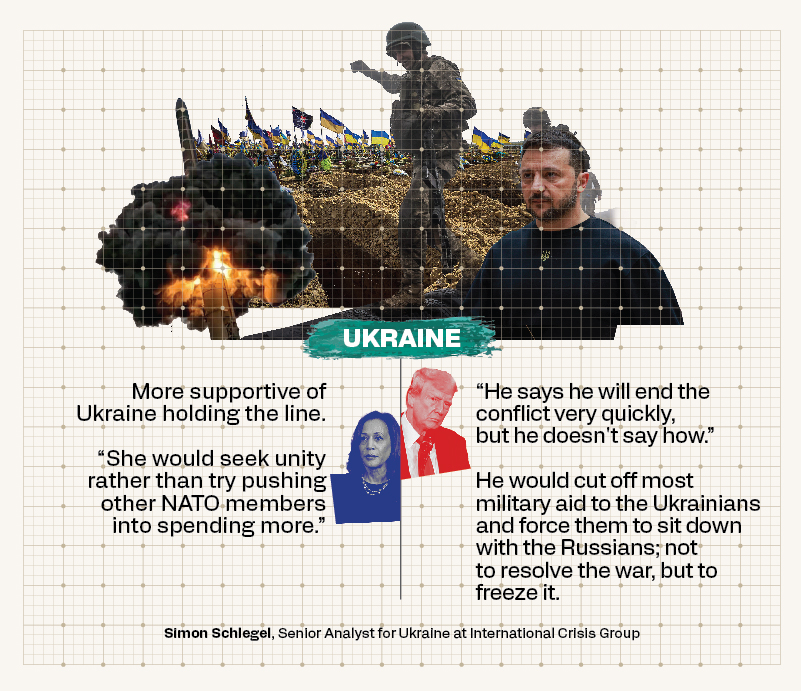
“Trump says he will end the conflict in Ukraine very quickly, but he doesn’t say how,” explains Simon Schlegel, Senior Analyst for Ukraine at International Crisis Group during a phone call with iMEdD from Kiev.
“Trying to end this conflict would mean that he would probably cut off most military aid to the Ukrainians and force them to sit down with the Russians; probably not how to resolve it, but how to freeze it along the current battlefield lines”.
The Russians are unlikely to support such a development as long as they feel they have the upper hand on the battlefield. Schlegel said that Trump will try to exert pressure on them economically, maybe, but by trying to lower the price of oil by swamping the market with American oil.
Trump is often viewed as unpredictable, leading many Ukrainians to believe that a second presidency could be beneficial. “They think that if Trump doesn’t get what he wants, – a quick end to the war – that then he would overreact maybe and unfriend Putin and open the front gates with American weapons”, Schlegel told iMEdD. “But I think much of that is wishful thinking. I think Trump is very clear that he’s very cautious about getting involved in foreign conflicts. His main priority militarily is China”.
In his latest book, Bob Woodward, a veteran journalist for the Washington Post, revealed that Donald Trump has had as many as seven private phone calls with Vladimir Putin since leaving office. Schlegel noted about that: “Trump is good friends with somebody, but then if that person is not loyal to him, he becomes mortal enemies with them as well”.
And what if Harris wins? “She hasn’t been too clear what an end of this war would look like to her. She has been clear that she is more supportive of Ukraine – at least holding the line – than Trump (is)”, the analyst explained. He said that Harris would probably continue this supportive but very cautious course of Joe Biden. But so far this hasn’t worked very well for Ukraine.
“Just giving more weapons now is also no longer a good option, because what the Ukrainians really need now is weapons that can strike inside Russia and that would cross what the Russians have stated are their red lines”, Schlegel told iMEdD. So just continuing this course is also not a good option for Ukraine. And she would have to come up with new ideas.
Concluding the analysis, Schlegel said that Harris would certainly put a very strong focus on NATO unity. “She would seek unity rather than trying to push other NATO members into spending more”, he said. “And that alone would probably help to send a signal to Moscow that NATO should not be tested”.
US-NATO/EU: “Τake Trump seriously, not literally.”
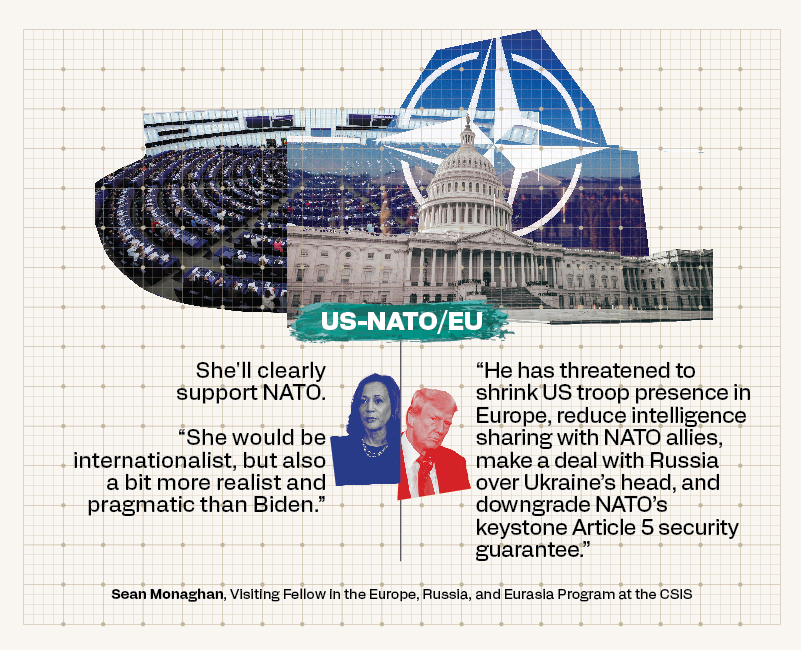
The next American president will need to navigate another complex foreign policy relationship: that with NATO and the European Union.
“To be clear, Trump is a factor in NATO’s future. If he returns to office in November, his “America-First” policies may undo much of the Biden administration’s efforts to strengthen transatlantic security in the wake of Russia’s 2022 invasion of Ukraine”, Sean Monaghan, visiting fellow in the Europe, Russia, and Eurasia Program at the CSIS, wrote in July.
“Trump has threatened to shrink U.S. troop presence in Europe, reduce intelligence sharing with NATO allies, make a deal with Russia over Ukraine’s head, and even downgrade NATO’s keystone Article 5 security guarantee for those who fail to pay their “bills”, Monaghan wrote.
No one can say for certain whether Trump would implement any of these measures. While he made similar threats during his first term, it can be concluded that his policies ultimately strengthened America’s deterrence in Europe. “As senior Republicans have advised NATO leaders: take Trump seriously, not literally,” Monaghan wrote.
Three months after the article mentioned above, iMEdD asked Monaghan to predict the scenario that might follow a potential election of Kamala Harris. “I think she’ll clearly support NATO. NATO is the most important network of allies and partners that the US has, particularly while there’s a war in Europe and while European security is under threat”, Monaghan wrote via email.
He recalled that Vladimir Putin’s war in Ukraine is not just a war in Ukraine, but it’s also a war in Europe. In fact his kind of demands were not just for Ukraine to capitulate, but was for NATO to capitulate and disband.
“So, he has his eyes on NATO, and I think, Kamala Harris would tackle that head on at the same time, she’s not a kind of dyed in the wool transatlantic artist in the same way that President Biden is”, Monaghan noted.
Monaghan clarified that while Biden grew up before the Cold War, the significant expansion of his political career coincided with that period. “So, transatlantic is in his blood”, Monaghan noted. “And he’s been a great supporter of Europe and of NATO throughout all of that. That’s instinctual. That’s not so instinctual for candidate Harris,” he told iMEdD.
“I think President Obama would maybe be a better frame of reference or comparison than President Biden. For her, she would be internationalist, but also perhaps a bit more realist and pragmatic than Biden.”
Special Report: US – China Trade War
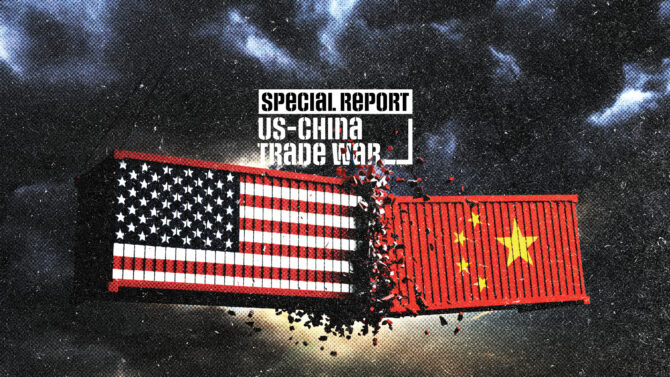
In mid-May 2024, US President Joe Biden announced plans to quadruple tariffs on Chinese electric cars. This was just the latest episode in the ongoing trade war between Washington and Beijing. Through interviews with Greek and foreign experts, analyses of geopolitical balances, and examination of the truth behind the numbers, iMEdD attempts to decode what has been described as the “New Cold War.”
US-China: China will not disappear
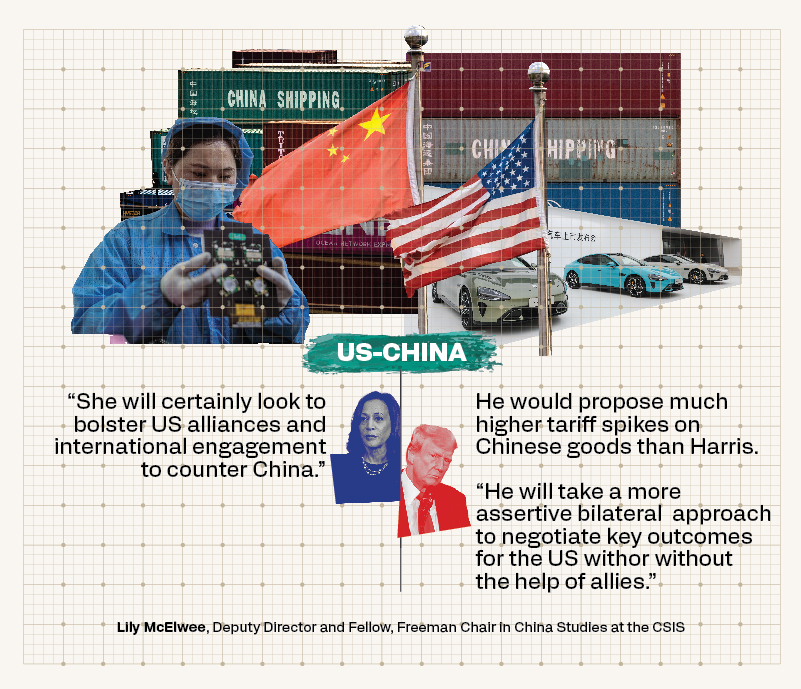
In mid-May 2024 Joe Biden announced plans to quadruple tariffs on Chinese electric cars. This was the latest episode in the trade war between Washington and Beijing – what has been described as the “New Cold War.” What will be the landscape the day after the US elections?
“Harris and Trump agree on the broad thrust of China policy: both see Beijing as a strategic competitor seeking to undermine US influence and liberal values on the world stage and undermine key components of the American economy at home,” Lily McElwee, Deputy Director and Fellow, Freeman Chair in China Studies at the CSIS, told iMEdD.
She explained that they will likely overlap on methods and tactics on some fronts (e.g. tariffs), while differing in the intensity of these methods; Trump proposing much higher tariff spikes on Chinese goods than Harris.
McElwee said there will be further divergences. “Harris will almost certainly look to bolster U.S. alliances and international engagement to counter China, while Trump will take a more assertive bilateral approach to negotiate key outcomes for the United States with or without the help of allies”, she noted.
“That said, this presidential election cycle overall has been relatively short on China policy prescriptions. Harris is an “unknown” on China policy given her limited historic engagement with the issue -and foreign policy more generally-, and Trump is best characterized as “unpredictable” when it comes to foreign policymaking, including on China”, McElwee explained.
As she noted, there is occasionally a discrepancy between Trump’s personal remarks and policies, as evidenced by his apparent disregard for Taiwan in media comments and his administration’s strong record of support for Taiwan in term one.
But are there substantive differences between the Democratic and Republican positions on the relationship between the world’s two most powerful economies? “Often when one looks at specific policies the two sides converge,” Andrew Nathan, Professor of Political Science at Columbia University, has told iMEdD in early August.
The area where the differences between the two parties seem to be clearer, concerns the next stage of the ongoing US-China trade war. “The difference with Republicans is that most Dems do not think it is possible to “win victory” over China, that China is not going to surrender or disappear, hence we have to manage a long-term competitive relationship,” Nathan noted.
COP 28: Climate diplomacy, the Israel-Palestine conflict and the global fossil fuel landscape
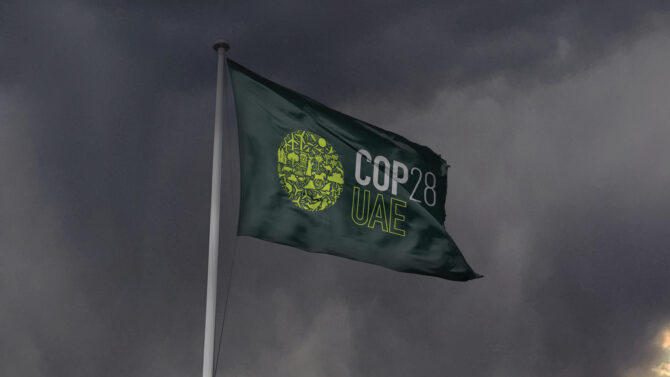
As 2023 came to an end, we witnessed the unfolding of COP 28, the world’s biggest international climate summit.
Climate Crisis: Step back or step forward?
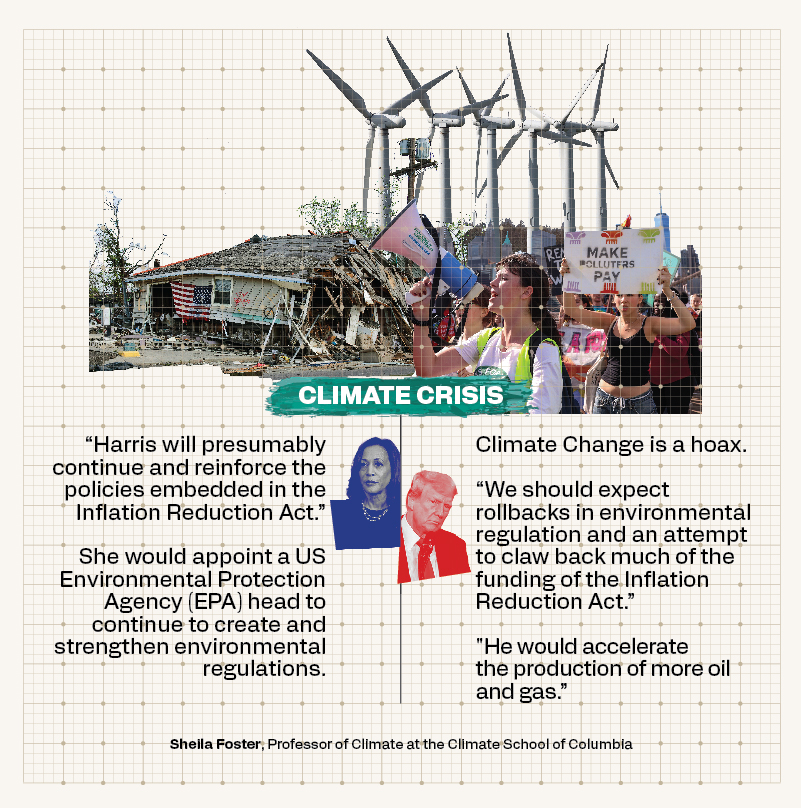
During the U.S. presidential debate, when asked about Climate Change, Kamala Harris responded by linking investments in “green energy” and the fossil fuel industry in a single statement. Donald Trump, on the other hand, has repeatedly stated in his speeches that Climate Change is a hoax.
Sheila Foster, Professor of Climate at the Climate School of Columbia University, told iMEdD that a Democratic presidency would maintain the progress made in Climate policy, while a Republican presidency could set the country back decades.
“[Kamala] will presumably continue and reinforce the policies embedded in the Inflation Reduction Act, which she cast the tie-breaking vote to pass as Vice President,” said Foster. The Inflation Reduction Act (IRA) is a law passed by the U.S. Congress and signed by Joe Biden in August 2022, which includes measures to address the Climate Crisis.
On the other hand, she said that Trump’s first term serves as a harbinger of the policies he will pursue. “We should expect rollbacks in environmental regulation (he rolled back 125 rules and policies during the first term) and an attempt to claw back much of the funding of the Inflation Reduction Act,” Columbia’s Professor noted. “He also pressured federal agencies to remove Climate science from their website. That would continue, presumably, as would his general efforts to gut the administrative state and even to abolish certain federal agencies,” Foster remarked.
Regarding the US’s commitment to international Climate Agreements, Foster commented: “We can expect that Harris will continue this path and appoint a U.S. Environmental Protection Agency (EPA) head to continue to create and strengthen environmental regulations aimed to reduce greenhouse gases (GHGs).”
In contrast, Trump is anticipated to attempt once more to withdraw the country from the Climate Agreement. “[He] would make every effort to roll back Biden-era rules as he did his first term with Obama-era standards” Foster told iMEdD. “He would appoint a head of EPA that shares his deregulatory agenda. He would also accelerate the production of more oil and gas.”
